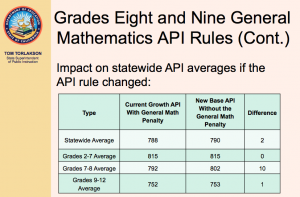An education committee recommended Tuesday that the state stop docking the test scores of districts that don’t offer Algebra I in 8th grade. The recommendation by the Public Schools Accountability Act Advisory Committee would reverse a decade-old practice and could go to the State Board of Education as early as next month.

Jenny Singh, administrator with CDE’s academic accountability unit, explains the 8th grade math recommendation (click to enlarge).
The Advisory Committee is charged with suggesting changes to the state’s school accountability system, the Academic Performance Index or API. It will soon be transformed as a result of the switch from state tests to tests aligned to the new Common Core standards, as well as the passage of Senate Bill 1458, which requires that career and college readiness measures and high school graduation rates be included, along with standardized test results, in the API.
On Tuesday, though, the committee dispensed with the controversial penalties and incentives surrounding 8th grade math.
The State Board already has already adopted Common Core’s pre-algebra course as the new default curriculum for 8th grade and stripped California’s Algebra I standards from 8th grade. Most students will likely take the full Common Core Algebra I in 9th grade. So dropping the penalties for offering non-Algebra math would be consistent with the Board’s intent and would mark the final move away from the policy of encouraging algebra-for-all in 8th grade.
Under the current accountability system, students who take General Math instead of Algebra I in 8th grade are knocked down one performance level in their standardized math test score, which then lowers their school’s API score. A student who scores proficient is dropped to basic, while a student who scores basic is knocked down to below basic – and so on. Students who take General Math in 9th grade are lowered two levels.

Bill Honig, who chairs a commission advising the State School Board on Common Core, explains that the new 8th grade Common Core math will be more rigorous than General Math offered now to students not taking Algebra. To his left is State School Board member Trish Williams.
A previous State Board adopted the scoring disincentives a decade ago to prod districts, particularly those with predominately minority students, to offer Algebra I in middle school to encourage more students to pursue higher math and science courses required for admission to four-year state universities. And it worked – at least in part. Over the past nine years, overall enrollment in Algebra I in 8th grade increased 41 percent, while the enrollments more than doubled for African American students and tripled for Hispanics. Proficiency rates slightly more than doubled, to 34 percent for African Americans and 42 percent for Hispanic students.
But that still left 60 percent of minority students less than proficient on their Algebra I standardized test. Studies by EdSource and recent research by WestEd concluded that too many 8th graders were being forced into Algebra I unprepared. Of those required to repeat it in high school, the odds that a student would pass the CST a second time were less than 20 percent.
While “a noble and important cause and intention, the most recent study showed there were a lot of problems with misplacement, with students hardly getting past Algebra I not to mention Algebra II,” said State Board member Trish Williams, the board’s liaison to the advisory committee.

No longer lowering test scores for schools that offer General Math in 8th grade will cause overall API numbers to rise 2 points statewide and an average of 10 points for 7th and 8th grades. However, a state Department of Education analysis projects that 40 percent of schools with 8th grade would not be affected (click to enlarge).
Supporters of the current system predict a sharp drop in Algebra enrollment in 8th grade under Common Core. Certainly, without the sanctions, schools will feel less pressure. A state Department of Education analysis projects that, with penalties removed, the average base API score in 7th and 8th grades will automatically rise 10 points, from 792 to 802. While 40 percent of schools will see no impact, 30 percent will see their scores rise one to five points, and 16 percent will see a 5 to 10 point gain.
But Bill Honig, a former state superintendent of public instruction and chairman of the commission advising the State Board on Common Core implementation, said the goal is to be neutral and to place students in the course they’re ready to take. The 8th grade Common Core math will be far more rigorous than General Math, he said, and Algebra will comprise one third of the content. He indicated that the State Board might consider rewarding students who do pass Common Core Algebra I in 8th grade. But the gauge will be performance in the course, not simply enrollment in it – an important distinction, he said.
The new assessments testing Common Core math standards are two years away. Until then, the current math tests, based on California math standards, will be given. However, the State Board will likely eliminate the General Math penalties now, in order to encourage districts to begin phasing in Common Core 8th grade math.
Roger Yoho, assessment and accountability director for Corona-Norco Unified, emphasized the importance of that in his testimony. “I have principals saying to me, ‘We want to get into Common Core, but we are still held accountable for the API.’ My reaction is to do what’s best for kids, but we still have to worry about API scores for a bunch of reasons.”
To get more reports like this one, click here to sign up for EdSource’s no-cost daily email on latest developments in education.












Comments (8)
Comments Policy
We welcome your comments. All comments are moderated for civility, relevance and other considerations. Click here for EdSource's Comments Policy.
Mark Roberts 11 years ago11 years ago
If you read the PACE Policy Brief, "Fixing the Academic Performance Index" January 2013 by Morgan Polikoff (USC)and Andrew McEachin (UVA), you will find that your assumptions are correct regarding the correlation of poverty level and the API. It also states that the API is a very unstable means to measure schools. Yet, we continue to use it to dismiss educators, administrators and superintendents for lack of significant progress. I believe something drastic needs … Read More
If you read the PACE Policy Brief, “Fixing the Academic Performance Index” January 2013 by Morgan Polikoff (USC)and Andrew McEachin (UVA), you will find that your assumptions are correct regarding the correlation of poverty level and the API. It also states that the API is a very unstable means to measure schools. Yet, we continue to use it to dismiss educators, administrators and superintendents for lack of significant progress. I believe something drastic needs to change in order to produce accurate data before we really make a difference with our students and schools. Just adding an incentive for Algebra passage is ludacris. In fact, “What does that mean? I’m affraid that many underperforming schools will use students like pawns and place them in Algebra I to increase the API instead of truely looking at what a student reallly needs to be successful.
Transparent 11 years ago11 years ago
@Caroline, we refer to it as Average Parental Income…
@Navigio, you are so right about the API
CarolineSF 11 years ago11 years ago
(Just for a quickie primer in the jargon of school food, an area in which I was a volunteer parent advocate for many years: "Participation" refers to students who eat in the cafeteria. Once you've gotten steeped in it, you have to remind yourself to say "students who eat in the cafeteria" rather than "participation." "Qualifying" for free and reduced-price lunch is generally the gauge used for a school's poverty level. A lot of students who qualify … Read More
(Just for a quickie primer in the jargon of school food, an area in which I was a volunteer parent advocate for many years:
“Participation” refers to students who eat in the cafeteria. Once you’ve gotten steeped in it, you have to remind yourself to say “students who eat in the cafeteria” rather than “participation.”
“Qualifying” for free and reduced-price lunch is generally the gauge used for a school’s poverty level. A lot of students who qualify may not actually “participate” — that is, eat the meals — depending on the situation and the culture at the school.)
CarolineSF 11 years ago11 years ago
This is why the savvy refer to API as Affluent Parent Index.
John Fensterwald 11 years ago11 years ago
A common affliction. Thanks for the information.
John Fensterwald 11 years ago11 years ago
navigio: F&R refers to those who qualify for free and reduced lunch, right? My acronym alert sounded …
Replies
Navigio 11 years ago11 years ago
Yes. Sorry, I use way too many acronyms. I’m sure there’s an acronym for that condition. 😉
Free and reduced participation is a function of income level. It’s usually somewhere around 185% of the poverty line, though I think it can change from year to year.
These rates are provided on the demographics page of CDE’s API site and they are also provided at Ed-data in the school comparison matrix.
navigio 11 years ago11 years ago
IMHO, the simplicity of the API was a mistake. We might as well do letter grades for schools like Florida does (and effectively assign them based on poverty level). In fact, just the other day, I looked at the correlation between API and a bunch of other school metrics (funding, staffing ratios, salary levels, demographics, etc) for about 900 California schools and by far F&R rate was the most highly correlated with API of all … Read More
IMHO, the simplicity of the API was a mistake. We might as well do letter grades for schools like Florida does (and effectively assign them based on poverty level). In fact, just the other day, I looked at the correlation between API and a bunch of other school metrics (funding, staffing ratios, salary levels, demographics, etc) for about 900 California schools and by far F&R rate was the most highly correlated with API of all the metrics (inversely so, obviously).
Bill, if you’re listening, what kind of ‘reward’ do you think might be considered and do you think its a good idea to put that reward into the measure of a school, or will it be in some other manner?